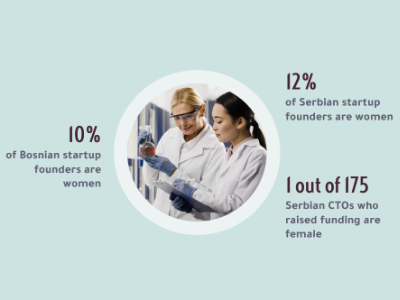Despite growing number of women graduates in STEM, women remain under-represented in ICT sectors and innovation, new study finds
ITU, UN Women and EQUALS join forces to launch study on Women, Girls and ICT in the context of Covid-19 in selected European countries.Date:

In a collaborative effort, the International Telecommunication Union (ITU), UN Women and the EQUALS Global Partnership to bridge the gender digital divide launch on 9 March 2021 the study “Digitally Empowered Generation Equality: Women, Girls and ICT in the context of Covid-19 in selected Western Balkan and Eastern Partnership Countries”.
The study focuses on the digital divide occurring in five Western Balkan states (Albania, Bosnia and Herzegovina, Montenegro, North Macedonia, Serbia) and three Eastern Partnership countries (Ukraine, Georgia, Moldova). In the countries profiled, the study found that women comprise more than 40 per cent of university graduates in STEM related fields. However, this did not translate in women and girls’ strong participation in the technology sectors, which remains low.
The study aims at identifying key factors and trends in the participation of women in the digital sector in education, career and entrepreneurship at a national level. It concludes into country-specific recommendations to develop a set of national initiatives fostering participation of women and girls in the ICT sector.
Doreen Bogdan-Martin, Telecommunications Development Bureau Director states ‘’Technology and the use of ICTs can be a game changer for women and girls all around the world. We also urgently need their fresh ideas to find effective solutions for sustainable development. Let’s use the window of opportunity brought about by the pandemic to tap into women’s innovative potential and accelerate the digital revolution.’’

The study also found that the participation of women in driving innovation is at a very low level across the region. For instance, only 12 per cent of Serbian start-up founders are women with the number of technical women founders even smaller. Only 1 out of 175 Serbian Chief Technology Officers (CTOs) who raised funding is a woman. In Bosnia and Herzegovina, only 10 per cent of start-up founders are women.
Women may be reluctant to start their own businesses due to avoidance of risk-taking, lack of available support services, limited exposure to the business world, and lack of access to capital. Absence of women working in technology is also concerning because of the pervasiveness of digital violence in the Western Balkans and Eastern European countries.
“While there is still a long way to go to close the digital gender divide, now is the time to take bold steps. The pandemic increased the importance of digital economies that rely on workers with STEM skills. Without special interventions, women’s limited participation in STEM will disadvantage them in the growing number of technical fields,” states Alia El-Yassir, UN Women Regional Director for Europe and Central Asia, “In 2020, in developing countries rural access to the Internet was 2.3 times as less as urban access and there is more gap in regard of access for the marginalized groups. Understanding the critical role that information and communication technologies play, we have to make sure that all women and girls enjoy the full fruits of the digital revolution,” she adds.
The COVID-19 crisis must be used to accelerate change, expand horizons for millions of girls, women and others who face intersectional discrimination to be able to benefit from the digital revolution.
“At the European level, gender quality is one of the top priorities of the region. Through its Regional Initiative for Europe on digital inclusion, ITU has been conducting several activities aiming at strengthening the role of digital technologies to empower all groups of society, including girls and women. Through these activities, support is provided in building inclusive policies, developing digital skills, and providing capacity building. This report is an important milestone leading towards the establishment of actionable initiatives at the country level,” states Jaroslaw Ponder, Head of the ITU Office for Europe.
The study highlights recommendations and best practices by thematic areas covering ICT access, STEM education, women working in ICTs and start-ups, digital education and safety.
The Generation Equality Forum and the Action Coalition on Technology and Innovation for Gender Equality to be launched in Paris in June 2021 is expected to catalyse collective action for an equal access to digital technologies and opportunities to design and influence digital innovations.
| Main findings 1. One third of graduates from STEM programmes in Europe are female, with only modest increases from 32.4 to 34.3 percent between 2009 and 2013, and 2014 and 2018. 2. Covid-19 related closures of schools affected approximately 6 million students in the region, and all countries in this study pivoted to distance/digital learning. 3. Digital education highlighted the lack of research addressing the effectiveness of online learning specifically from a gender perspective. 4. The report demonstrates how remote learning poses organizational and time-management challenges for girls and women. 5. Most students in report countries have Internet access at home. Girls receive access to digital technology at a later age than boys, and their use of digital technology is more often curtailed by their parents. 6. Covid-19 also revealed limitations to online service provision due to lack of sufficient devices at household level in both urban and rural areas. 7. It is estimated that only 20-25% of students in Europe are taught by digitally confident teachers. Digital competence in the classroom is a gender issue, as the majority of schoolteachers are female. 8. Overall, both male and female students lack understanding of the relevance and real-world applications of technology. The way in which STEM subjects are taught influences girl’s motivation to pursue technology careers later in life. 9. Despite the relatively high number of STEM graduates within the Balkans and Eastern Partnership countries, women are less likely than men to consider a technical career. The low numbers of women in ICT fields overall becomes more pronounced at senior levels. 10. The new work from home culture ushered in by Covid-19 brings about new opportunities and challenges for gender equality in the context of ICT. 11. Digital technology is a double-edged sword in gender equality, the same digital platforms have also been weaponized through technology facilitated violence against women and girls. |
| Implementable recommendations 1. Refine ICT related indicators through meaningful access and connectivity targets 2. Support extra-curricular STEM enrichment programs for girls 3. Expand the reach of Enrichment Programs through Cooperation with National Educational Systems 4. Conduct further research into online and hybrid learning models from a gender perspective 5. Facilitate partnerships between startups/ICT companies and technology training programs to offer girls real world experience 6. Train teachers in digital literacy and competence to ensure effective use of technology in schools 7. Encourage gender sensitive STEM learning environments 8. Conduct research on the “Leaky Pipeline” between female STEM graduates and technology employment 9. Collect Precise Gender-Disaggregated Data within the ICT Industry 10. Institute Gender-Sensitive Recruiting Efforts to encourage more women applications in ICT companies 11. Offer Company Benefits addressing Work Life Balance 12. Offer Flexible Professional Development Programs 13. Use Data Driven Guidelines to Integrate Gender Equality into Company Culture 14. Upskill and Retrain Women to Work in ICT 15. Support gender-sensitive startup investing, including women investing in women 16. Build upon existing national programming for online child safety to include gender sensitive approaches 17. Reform legal frameworks and codes of conduct to address digital violence |
The executive summary for the study and the full report can be accessed here. The special session for the report launch was held within the framework of the 2021 UN Regional Forum for Sustainable Development for UNECE Region and the ITU Regional Forum for Europe on Meaningful Connectivity.